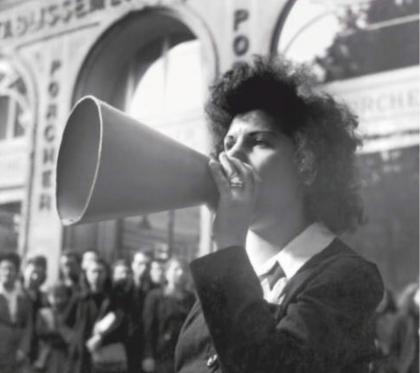She was closer to her audiences than any film star; she could feel them press round her, watch how they reacted, notice the women with their prams or the passing cyclists pausing to listen, see new lovers leaning on each other as they sang from a score. Spreading love in songs was another job she was doing. Street singing combined the two essentials in her life. One was Paris, specifically on or near the place de la Nation and the rue de Buzenval, where she was born and where she lived for her last 70 years.
莉莉比任何電影明星都更接近她的觀眾;她能感覺(jué)到他們緊緊圍繞著她,觀察著他們的反應(yīng),留意那些推著嬰兒車的婦女,或者停下來(lái)傾聽的路過(guò)的騎自行車的人,看著新戀人靠在一起唱歌。用歌聲傳播愛(ài)是她的另一項(xiàng)工作。街頭演唱結(jié)合了她生活中的兩個(gè)要素。一個(gè)是巴黎,確切地說(shuō)是在民族廣場(chǎng)和布曾瓦爾街附近,她就在那里出生,她最后70年也生活在那里。
Her popular name was “Lily Panam”, argot for “Paris Lily”. As a child she had been dragged to le Nord for a while, to a farmhouse half-drowned in mud; she pined for the sparkling city she had seen from her parents’ tiny mansard flat. She needed pavements. And she needed to sing, so ardently that nothing could stop her. As she ran errands or peeled vegetables, she sang. As her parents split up, with their new partners variously abusing her, she cried a bit, shouted back, but sang. At 18, having definitively run away with five francs in her pocket, she was posing for naked tableaux in Pigalle.
她的流行名字是“莉莉·帕納姆”,是“帕里斯·莉莉”的暗語(yǔ)。還是個(gè)孩子的時(shí)候,她曾被拖到北部省住過(guò)一段時(shí)間,住在一個(gè)半淹沒(méi)在泥里的農(nóng)舍里;莉莉懷念她在父母的小折疊式公寓里看到的那個(gè)閃閃發(fā)光的城市。她需要人行道。她需要唱歌,熱情滿腔,沒(méi)有什么能阻止她。每當(dāng)莉莉外出辦事或者去蔬菜皮時(shí),她都會(huì)唱歌。在她的父母分手后,他們的新伴侶對(duì)她進(jìn)行各種各樣的虐待,她有時(shí)會(huì)哭,也會(huì)大聲回?fù)簦€是一直唱歌。18歲時(shí),她最終決定揣著5個(gè)法郎逃跑了,她在皮加勒區(qū)擺裸體造型。

During the German Occupation she hid in a cousin’s hotel to escape forced labour. Between times she did shop-work, and sang. The street was her escape. Yet she could not help dreaming of stardom, too. It was possible. In 1935 she had encountered Edith Piaf, a little scrap of a woman in a shabby black dress, performing on the street illegally. She agreed to watch out for the police on Sundays, and for a spell Piaf coached her in how to sing as she did, from the heart and guts. But soon she was discovered, and their ways parted.
在德國(guó)占領(lǐng)期間,她躲在一個(gè)表兄的旅館里以逃避強(qiáng)制勞動(dòng)。期間,她在店鋪打過(guò)工,也唱過(guò)歌。街道就是她的避難所。然而,她也禁不住夢(mèng)想著成為一名明星。這是有可能的。1935年,她偶然遇到了伊迪絲·琵雅芙,一個(gè)衣衫襤褸的小女人,在街上非法表演。她同意在星期天提防警察,有一段時(shí)間琵雅芙全心全意地教她唱歌。但是,莉莉很快就被發(fā)現(xiàn)了,于是他們就分道揚(yáng)鑣了。
譯文由可可原創(chuàng),僅供學(xué)習(xí)交流使用,未經(jīng)許可請(qǐng)勿轉(zhuǎn)載。












